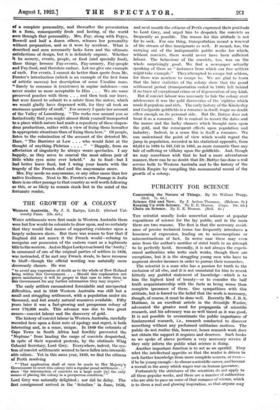THE GROWTH OF A COLONY
WiteN settlements were first made in Western Australia there were but few would-be colonists to draw upon, and no certainty that they would find means of supporting existence upon a largely unknown shore. But there was reason to fear that if England did not annex it the French would—refusing to recognize our possession of the eastern coast as a legitimate title to the western. And so Major Lockyer on board the 'Amity,' in command of one of the original parties of settlers in 1826, was instructed, if he met any French rivals, to have recourse to bluff—though the official wording was naturally more decorously chosen. He was "to avoid any expression of doubt as to the whole of New Holland being within this Government. . . . Should this explanation not prove satisfactory it will be proper in that case to refer them to this Government for any further information they may require."
The early settlers encountered formidable and unexpected difficulties, and in 1849 Western Australia was still but a small and struggling settlement, with a population under six thousand, and but scanty natural resources available. Fifty years later it was a fast-growing and prosperous colony of over 170,000 souls. This advance was due to two great causes--convict labour and the discovery of gold.
The history of convict labour in Western Australia, carefully recorded here upon a faint note of apology and regret, is both interesting and, in a sense, unique. In 1849 the colonists of Cape Town in South Africa had forcibly prevented the ' Neptune ' from landing the cargo of convicts despatched, in spite of their repeated protests, by the obstinate Whig Colonial Secretary, Lord Grey. Everywhere, indeed, the sys- tem of convict settlements seemed to have fallen into irremedi- able odium. Yet in this same year, 1849, we find the citizens of Perth resolving " That application shall at once be made to Her Majesty's Government to erect this colony into a regular penal settlement...' since the introduction of convicts on a large scale (is) the only means of placing the colony in a prosperous condition.'" Lord Grey was naturally delighted ; nor did he delay. The first consignment arrived in the Scindian ' in June, 1850, and next month the citizens of Perth expressed their gratitude to Lord Grey, and urged him to despatch the convicts as frequently as possible. The reason for this attitude is not far to seek. For one thing, transportation meant a renewal of the stream of free immigrants as well. It meant, too, the carrying out of the indispensable public works for which, without convicts, there would never have been sufficient labour. The behaviour of the convicts, too, was on the whole surprisingly good. We find a newspaper actually speaking of them as instances from which our free settlers might take example." They attempted to escape but seldom, for there was nowhere to escape to. We are glad to learn that the later statistics of the colony show that the penal settlement period (transportation ended in 1868) left behind it no trace of exceptional crime or of degeneration of any kind.
But if convict labour was necessary to tide the colony over adolescence it was the gold discoveries of the 'eighties which made it populous and rich. The early history of the Kimberley and Coolgardie goldfields is a romance in itself, tragic no doubt often enough on its personal side. But Dr. Bettye does not treat it as a romance. He is content to record the dates and the names and the lucky chances which brought men upon the gold, and the consequent effects upon population and industry. Indeed, in a sense this is itself a romance. We can understand the point of view which would regard the jump in population, recorded in his statistical appendix, from 82,014 in 1894 to 101,143 in 1895, as more romantic than any tale of suffering or villainy upon the goldfields. And, though we may sometimes wish that he had a more adventurous manner, there can be no doubt that Dr. Battye has done a real service both to Western Australia and to the history of the British Empire by compiling this monumental record of the growth of a colony.






































 Previous page
Previous page